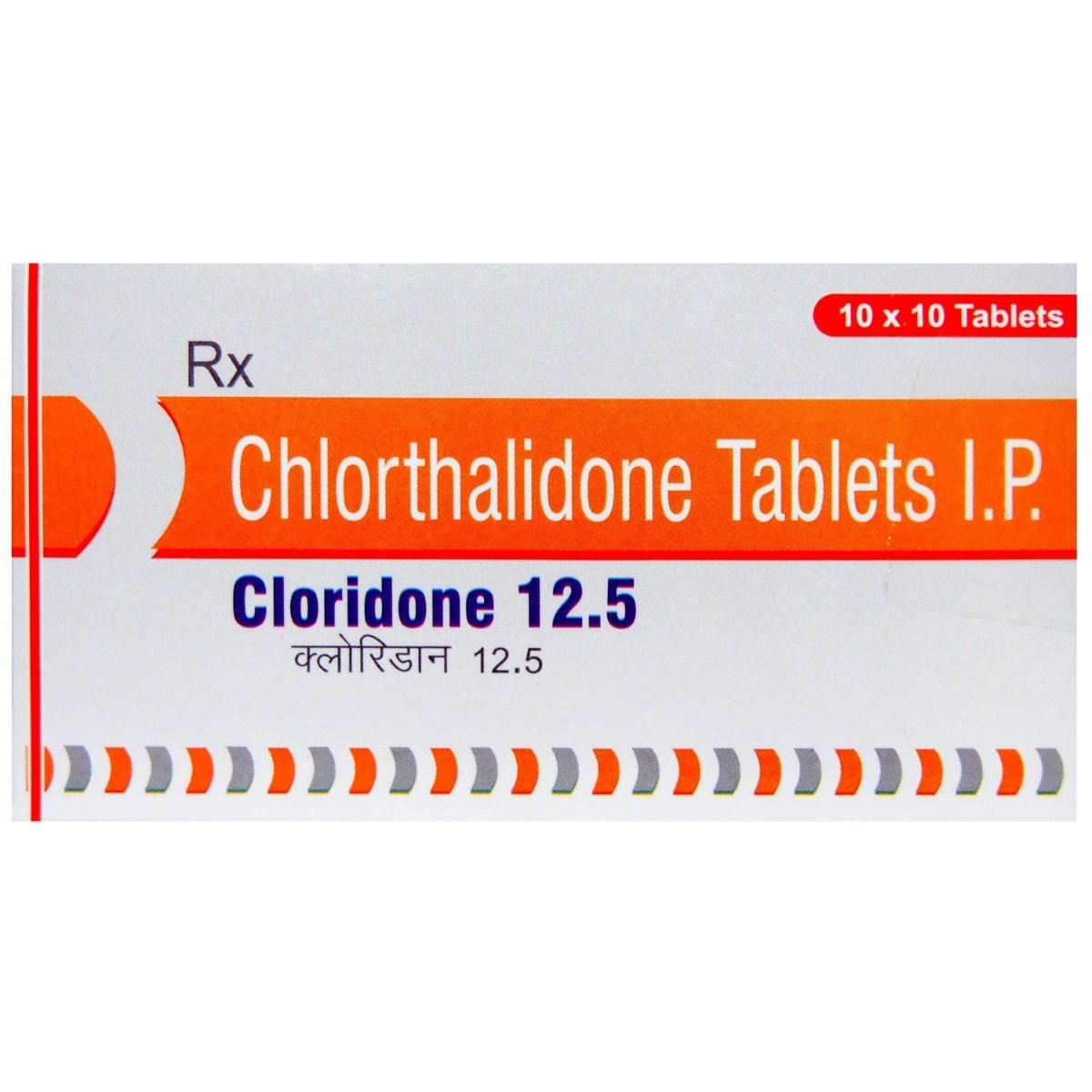Chlorvix 12.5 Tablet 15's
MRP ₹92.5
(Inclusive of all Taxes)
₹13.9 Cashback (15%)
Provide Delivery Location

secured payment

india's most trusted pharmacy

genuine products
Composition :
Manufacturer/Marketer :
Consume Type :
Expires on or after :
Return Policy :
About Chlorvix 12.5 Tablet
Chlorvix 12.5 Tablet belongs to a group of medicines known as diuretics (water pills which increase urine production) primarily used to treat high blood pressure, heart failure, and oedema (a build-up of fluid in the body). Hypertension or high blood pressure is a lifelong or chronic condition in which the force exerted by the blood against the blood vessel (arteries wall) increases. The higher this blood pressure, the harder the heart has to pump. As a result, it leads to heart diseases, irregular heartbeat, and other complications. Oedema may occur in case of high blood pressure where fluids of the body get trapped in the tissues of the hands, arms, feet, ankles, and legs, leading to swelling.
Chlorvix 12.5 Tablet contains Chlorthalidone, and it works by increasing the amount of urine passed out from the kidneys. It effectively reduces excess fluid levels in the body and treats oedema (swelling) associated with heart, liver, kidney, or lung disease. This, in turn, reduces the workload on the heart and makes the heart more efficient at pumping blood throughout the body. So, it helps to lower high blood pressure, reducing the chances of heart attack or stroke.
In some cases, you may experience headaches, nausea, or dizziness. Most of these side effects of Chlorvix 12.5 Tablet do not require medical attention and gradually resolve over time. However, if the side effects are persistent, reach out to your doctor.
Try not to stop taking this medicine of your own. Tell your doctor about this, as it may cause a rise in blood pressure and can increase the risk of getting heart complications like stroke and heart diseases. Inform your doctor if you are suffering from kidney, liver, or heart disease or are diabetic. If you are pregnant or breastfeeding, please tell your doctor so that the dosage of Chlorvix 12.5 Tablet can be prescribed accordingly. Taking Chlorvix 12.5 Tablet during pregnancy may cause side effects like jaundice (yellowing of the skin or eyes), unexplained bleeding, low blood sugar, or an electrolyte imbalance in the newborn baby. Do not use Chlorvix 12.5 Tablet if you are unable to urinate, have low blood pressure (hypotension), gout (excess uric acid), high cholesterol (hyperlipidaemia), cardiogenic shock (sudden stopping of blood flow to the heart). Please tell your doctor if you are taking any other medicines or are allergic to this medicine. Reducing the amount of table salt (sodium chloride) in your food often relieves the swelling of the body.
Uses of Chlorvix 12.5 Tablet

Have a query?
Directions for Use
Key Benefits
When you take Chlorvix 12.5 Tablet , the blood vessels in your body will be relaxed, which will help lower the raised blood pressure. Also, it widens the blood vessels (lining of arteries wall) and helps to improve the blood flow. It helps in losing out excess fluids from the body by increasing the production of urine. This reduces the workload on the heart and makes the heart more efficient at pumping blood throughout the body. Thus, it helps to lower high blood pressure, reducing the chances of heart attack or stroke. Chlorvix 12.5 Tablet also helps decrease fluid buildup, which reduces inflammation or swelling. In addition, this relieves oedema and helps you carry out your daily activities more efficiently.
Storage
- Chest pain may last for a while and needs immediate medical attention as it is a significant health issue to be attended to.
- Take rest and refrain from doing physical activity for a while, and restart after a few days.
- Try applying an ice pack to the strained area for at least 20 minutes thrice a day. Ice pack thus helps reduce inflammation.
- Sit upright and maintain proper posture if there is persistent chest pain. • Use extra pillows to elevate your position and prop your chest up while sleeping.
- If you experience low blood pressure symptoms like dizziness, lightheadedness, or fainting while taking medication, seek immediate medical attention.
- Make lifestyle modifications and adjust your medication regimen under medical guidance to manage low blood pressure.
- As your doctor advises, regularly check your blood pressure at home. Record your readings to detect any changes and share them with your doctor.
- Fluid intake plays a vital role in managing blood pressure by maintaining blood volume, regulating blood pressure, and supporting blood vessel function. Drinking enough fluids helps prevent dehydration, maintain electrolyte balance, and regulate fluid balance.
- Take regular breaks to sit or lie down if you need to stand for long periods.
- When lying down, elevate your head with extra pillows to help improve blood flow.
- Avoid heavy exercise or strenuous activities that can worsen low blood pressure.
- Wear compression socks as your doctor advises to enhance blood flow, reduce oedema, and control blood pressure.
- If symptoms persist or worsen, or if you have concerns about your condition, seek medical attention for personalized guidance and care.
- Heart failure needs immediate medical attention. To manage this effect, the doctor's instructions must be followed strictly.
- Take care of change in your weight as there can be sudden changes.
- Rest and refrain from physical activity, and restart after a few days.
- Reduce your salt intake and control your diet with the help of a dietician.
- Track your symptoms and keep your follow-up appointments to manage severe side effects.
- Inform your doctor about the symptoms you're experiencing due to medication.
- Your doctor may adjust your treatment plan, which could include changing your medication, adding new medications, or offering advice on managing your symptoms.
- Practice good hygiene, including frequent handwashing, avoiding close contact with others, and avoiding sharing utensils or personal items.
- Stay hydrated by drinking plenty of fluids to help loosen and clear mucus from your nose, throat, and airways.
- Get plenty of rest and engage in stress-reducing activities to help your body recover. If your symptoms don't subside or worsen, consult your doctor for further guidance.
- Eat fiber-rich foods, fruits, and vegetables.
- Monitor calorie intake and limit external food sources.
- Weigh yourself weekly to track progress.
- Enjoy balanced meals and indulge in treats moderately.
- Prioritize sleep, exercise, and stress-reducing techniques.
- Eat more plant based foods like vegetables, fruits and whole grains.
- Reduce intake of foods containing high fat such as dairy, oil and red meat.
- Exercise for at least 30 minutes 5 days a week.
- Aim for weight loss and maintain healthy weight.
- Quit smoking.
- Control blood sugar and blood pressure.
- Exercising regularly helps lower the risk of heart problems.
- Maintain a healthy diet, including vegetables and fruits.
- Rest well; get enough sleep.
- Manage stress with yoga and meditation.
- Limit alcohol and smoking.
Drug Warnings
Chlorvix 12.5 Tablet should not be given to the people allergic to Chlorvix 12.5 Tablet , have low blood pressure (less than 90 mm of Hg), have had a heart attack, kidney disease, liver disease, gout (high uric acid), high cholesterol (hyperlipidemia), pregnant women, or planning to get pregnant and breastfeeding women. Besides this, it is contraindicated in people with cardiogenic shock (sudden stopping of blood flow to the heart), and aortic stenosis (heart valve problem). Chlorvix 12.5 Tablet can pass into breast milk, but its effect on the baby is unknown. So, it is better to tell your doctor if you are taking Chlorvix 12.5 Tablet and breastfeeding. Tell your doctor if you are on low sodium (table salt) diet. Cases of electrolyte imbalance have been observed (like low levels of sodium, potassium, or magnesium in your blood). So your doctor might advise monitoring blood pressure, kidney function test, and electrolytes.
Drug-Drug Interactions
Drug-Drug Interactions
Login/Sign Up
Coadministration of thioridazine with Chlorvix 12.5 Tablet can increase the risk of low blood pressure especially when standing up.
How to manage the interaction:
Taking Thioridazine with Chlorvix 12.5 Tablet is not recommended, but can be taken together if prescribed by a doctor. However, consult a doctor if you experience any excessive sweating, palpitations, chest discomfort, or shortness of breath. Do not discontinue any medication without consulting a doctor.
Taking pazopanib with Chlorvix 12.5 Tablet may increase the blood levels of pazopanib.
How to manage the interaction:
Although there is an interaction between Pazopanib and Chlorvix 12.5 Tablet, it can be taken if your doctor has advised it. However, consult a doctor immediately if you experience fever, chills, joint pain or swelling, unusual bleeding or bruising, skin rash, itching, nausea, vomiting, dark-colored urine, and/or yellowing of the skin or eyes. Do not discontinue any medications without consulting your doctor.
Taking Chlorvix 12.5 Tablet and Ceritinib can increase the risk of an irregular heart rhythms.
How to manage the interaction:
Taking Ceritinib with Chlorvix 12.5 Tablet together can possibly result in an interaction, it can be taken if your doctor has advised it. However, consult your doctor if you experience dizziness, shortness of breath, palpitations, or irregular heartbeat. Do not stop using any medications without first talking to your doctor.
Co-administration of Ritodrine with Chlorvix 12.5 Tablet it may reduces the effectiveness of both the medications.
How to manage the interaction:
There may be a possibility of interaction between Ritodrine and Chlorvix 12.5 Tablet, but it can be taken if prescribed by a doctor. Do not stop using any medications without talking to a doctor.
Taking Chlorvix 12.5 Tablet and Terbutaline may reduce the beneficial effects of both medications.
How to manage the interaction:
There may be a possibility of interaction between Terbutaline and Chlorvix 12.5 Tablet, but it can be taken if prescribed by a doctor. Consult your doctor immediately if you experience shortness of breath, palpitations, or chest discomfort. Do not stop using any medications without a doctor's advice.
Taking Morphine with Chlorvix 12.5 Tablet can increase the risk of side effects.
How to manage the interaction:
Although taking Morphine and Chlorvix 12.5 Tablet together can cause an interaction, it can be taken if a doctor has suggested it. However, if you notice any shortness of breath, dizziness, or weakness, consult a doctor right away. Do not stop using any medications without consulting a doctor.
Coadministration of Chlorvix 12.5 Tablet with verapamil can increase the risk or severity of side effects.
How to manage the interaction:
Although there may be an interaction, Chlorvix 12.5 Tablet can be taken with verapamil if prescribed by the doctor. However, consult the doctor if you experience headaches, swelling of legs and hands, shortness of breath, chest pain, or palpitations. Do not discontinue any medications without a doctor's advice.
When Chlorvix 12.5 Tablet is taken with Efavirenz, blood levels of Chlorvix 12.5 Tablet can be increased.
How to manage the interaction:
Taking Chlorvix 12.5 Tablet with Efavirenz together can result in an interaction, but it can be taken if your doctor has advised it. If you experience any unusual symptoms consult a doctor immediately. Do not stop using any medications without talking to a doctor.
Taking Bisoprolol with Chlorvix 12.5 Tablet can increase the risk of low blood pressure and high potassium levels.
How to manage the interaction:
Although there is an interaction, bisoprolol can be taken with Chlorvix 12.5 Tablet if prescribed by the doctor. However, consult your doctor if you experience any lightheadedness, excessive sweating, or shortness of breath. Do not discontinue the medication without consulting a doctor.
Taking Chlorvix 12.5 Tablet and Indacaterol may reduce the treatment outcomes.
How to manage the interaction:
There may be a possibility of interaction between Indacaterol and Chlorvix 12.5 Tablet, but it can be taken if prescribed by a doctor. Do not stop using any medications without a doctor's advice.
Drug-Food Interactions
Drug-Food Interactions
Login/Sign Up
Avocado, Beetroot, Cereals, Cheese, Chicken, Black Beans, Eggs, Clams, Chickpea, Whole Grains, Shellfish, Spinach, Salmon, Red Meat, Oysters, Potatoes, Kidney Beans, Mackerel, Milk, Kale, Tuna, Yogurt, Liver, Low-Fat Milk, Trout, Fortified Breakfast Cereal, Fish, Beef
How to manage the interaction:
The effects of Chlorvix 12.5 Tablet may be reduced if taken along with multivitamins and minerals. Give Chlorvix 12.5 Tablet and multivitamins and minerals at least two hours gap in between doses to avoid interaction. Do not stop taking any medications without consulting a doctor.
Diet & Lifestyle Advise
- Consume antioxidant-rich food. Blueberries, cherries, tomatoes, squash, and bell peppers are high in antioxidants.
- Eat natural diuretic foods. Asparagus, beets, green beans, grapes, onion, leafy greens, pineapple, leeks, pumpkin, and garlic are all-natural diuretic foods.
- Use healthy cooking oils like soybean, olive, canola, and coconut oil.
- You should avoid refined foods such as white bread, spaghetti, sugar, and red meat.
- Reduce or eliminate Trans fatty acids, which are found in commercially baked items such as cookies, cakes, crackers, French fries, onion rings, doughnuts, and processed foods.
- Avoid consumption of too much salt or salty food.
- Keep your weight under control with a BMI of 19.5-24.9.
- Regular physical activity or exercise like walking improves your blood flow.
- When possible, elevate your legs or the swollen area on a chair or pillows.
- Avoid standing or sitting for extended periods of time.
- Avoid chronic stress as it can raise your blood pressure.
- Spend time with your loved ones to cope with stress and practice mindfulness techniques.
- Quitting smoking and alcohol consumption is the best strategy to lower the risk of many health complications.
Habit Forming
Therapeutic Class
All Substitutes & Brand Comparisons
RX
Out of StockChlohat 12.5mg Tablet
Akesiss Pharma Pvt Ltd
₹33.33
(₹3.0 per unit)
45% CHEAPERRX
Out of StockChlorthed 12.5 Tablet
Prevego Healthcare & Research Pvt Ltd
₹45
(₹4.05 per unit)
27% CHEAPERRX
CLORIDONE 12.5MG TABLET 10'S
Maxford Labs Pvt Ltd
₹46.5
(₹4.19 per unit)
24% CHEAPER
Special Advise
If you have taken high doses drink more water and Consult your doctor immediately.
FAQs
Chlorvix 12.5 Tablet contains Chlorthalidone, and it works by increasing the amount of urine passed out from the kidneys. It effectively reduces excess fluid levels in the body and treats oedema (swelling) associated with heart, liver, kidney, or lung disease. This, in turn, reduces the workload on the heart and makes the heart more efficient at pumping blood throughout the body. So, it helps to lower high blood pressure, reducing the chances of heart attack or stroke.
Yes, Chlorvix 12.5 Tablet can cause dizziness. It is advised to avoid driving or operate any heavy machinery while taking Chlorvix 12.5 Tablet . In case you feel dizzy or lightheaded, it is advised to rest for some time until you feel better.
Taking Chlorvix 12.5 Tablet may cause dehydration. So, to avoid dehydration, drink plenty of fluids and inform your doctor if you feel extremely thirsty.
It's unlikely that Chlorvix 12.5 Tablet affects fertility in men or women. However, some water pills like hydrochlorothiazide may lead to erectile dysfunction. There's not enough evidence to say for certain. For the best advice, consult your doctor.
Chlorvix 12.5 Tablet can be safely taken as long as your doctor has prescribed it to you. Conditions such as high blood pressure are life-long conditions and one should not abruptly discontinue it without discussing it with a doctor.
No, you are advised to inform your doctor and monitor your blood pressure for at least two weeks before stopping the medicine. Depending upon your current blood pressure readings, there is a possibility your doctor may lower your medicine dosage and not recommend discontinuing it.
Country of origin
Manufacturer/Marketer address
Disclaimer
Author Details
We provide you with authentic, trustworthy and relevant information










